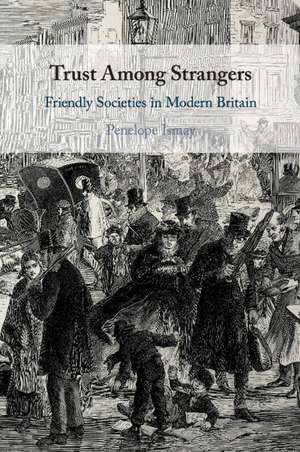Trust Among Strangers: Friendly Societies in Modern Britain
Autor Penelope Ismayen Limba Engleză Paperback – 18 sep 2019
| Toate formatele și edițiile | Preț | Express |
|---|---|---|
| Paperback (1) | 281.88 lei 43-57 zile | |
| Cambridge University Press – 18 sep 2019 | 281.88 lei 43-57 zile | |
| Hardback (1) | 605.41 lei 38-44 zile | |
| Cambridge University Press – 29 aug 2018 | 605.41 lei 38-44 zile |
Preț: 281.88 lei
Nou
Puncte Express: 423
Preț estimativ în valută:
53.94€ • 56.47$ • 44.63£
53.94€ • 56.47$ • 44.63£
Carte tipărită la comandă
Livrare economică 07-21 aprilie
Preluare comenzi: 021 569.72.76
Specificații
ISBN-13: 9781108459945
ISBN-10: 1108459943
Pagini: 229
Ilustrații: 6 b/w illus. 2 maps 1 table
Dimensiuni: 153 x 230 x 12 mm
Greutate: 0.31 kg
Editura: Cambridge University Press
Colecția Cambridge University Press
Locul publicării:Cambridge, United Kingdom
ISBN-10: 1108459943
Pagini: 229
Ilustrații: 6 b/w illus. 2 maps 1 table
Dimensiuni: 153 x 230 x 12 mm
Greutate: 0.31 kg
Editura: Cambridge University Press
Colecția Cambridge University Press
Locul publicării:Cambridge, United Kingdom
Cuprins
Introduction: new beginnings; 1. Friendly society before friendly societies; 2. Friendly societies and the meaning of the new poor law; 3. The battle between savings banks and friendly societies; 4. Trusting institutions: making the Independent Order of Odd Fellows, Manchester Unity; 5. Trusting numbers: sociability and actuarial science in the Manchester Unity; Epilogue: alternative endings.
Recenzii
'Few books actually change the way we conceptualize British history, yet this is one of those rare achievements. Penelope Ismay excavates the larger landscape of mutuality and reciprocity, revealing the vital significance of friendly society in the industrial age. We are all in her debt.' Deborah Valenze, Barnard College, New York
'Penelope Ismay adds much to what we thought we knew about British friendly societies, especially their technologies for maintaining trust as their membership expanded in the nineteenth century. But she also locates them in a context we never thought to ask about, namely the varied political strategies, dating back into the sixteenth century, for 'organizing reciprocity', including Christian charity, the Elizabethan poor law, savings banks, and, ultimately, the welfare state. With this insight, Trust among Strangers forces us to rethink the persistent and multifaceted place of community in modern life.' Timothy Alborn, Lehman College, City University of New York
'This groundbreaking study re-evaluates the foundation of friendly societies, focusing on how they maintained long-held notions of sociable, trust-based mutuality throughout the nineteenth century, in the face of opposition from actuarial science. It convincingly shows how the friendly society was an institution through which the working class was able to embed its own welfare in communities, and will be necessary reading for anyone interested in the social history of the subject.' Craig Muldrew, University of Cambridge
'An exceptional work of history revealing how the principle of mutuality, built upon notions of friendship and trust, and embedded in the practices of friendly societies from the time of Daniel Defoe, played a central role in the formation of the modern welfare state. It played a special role in the thinking behind the National Health Service, which might be considered a friendly society writ large.' Gareth Stedman Jones, Queen Mary University of London
'Penelope Ismay adds much to what we thought we knew about British friendly societies, especially their technologies for maintaining trust as their membership expanded in the nineteenth century. But she also locates them in a context we never thought to ask about, namely the varied political strategies, dating back into the sixteenth century, for 'organizing reciprocity', including Christian charity, the Elizabethan poor law, savings banks, and, ultimately, the welfare state. With this insight, Trust among Strangers forces us to rethink the persistent and multifaceted place of community in modern life.' Timothy Alborn, Lehman College, City University of New York
'This groundbreaking study re-evaluates the foundation of friendly societies, focusing on how they maintained long-held notions of sociable, trust-based mutuality throughout the nineteenth century, in the face of opposition from actuarial science. It convincingly shows how the friendly society was an institution through which the working class was able to embed its own welfare in communities, and will be necessary reading for anyone interested in the social history of the subject.' Craig Muldrew, University of Cambridge
'An exceptional work of history revealing how the principle of mutuality, built upon notions of friendship and trust, and embedded in the practices of friendly societies from the time of Daniel Defoe, played a central role in the formation of the modern welfare state. It played a special role in the thinking behind the National Health Service, which might be considered a friendly society writ large.' Gareth Stedman Jones, Queen Mary University of London
Descriere
The first major historical study of social trust in modern Britain, this book offers a fresh perspective on friendly societies.
